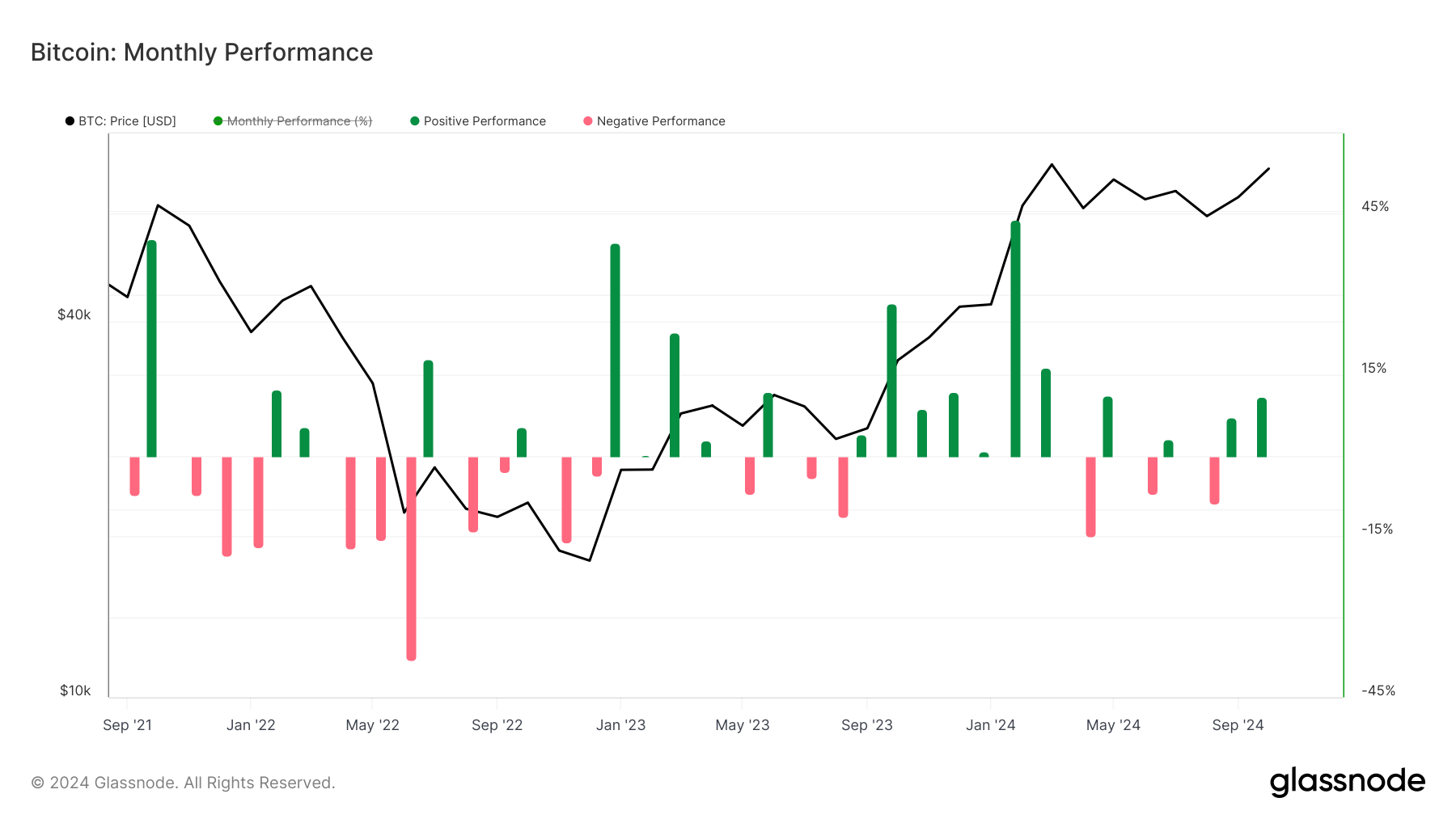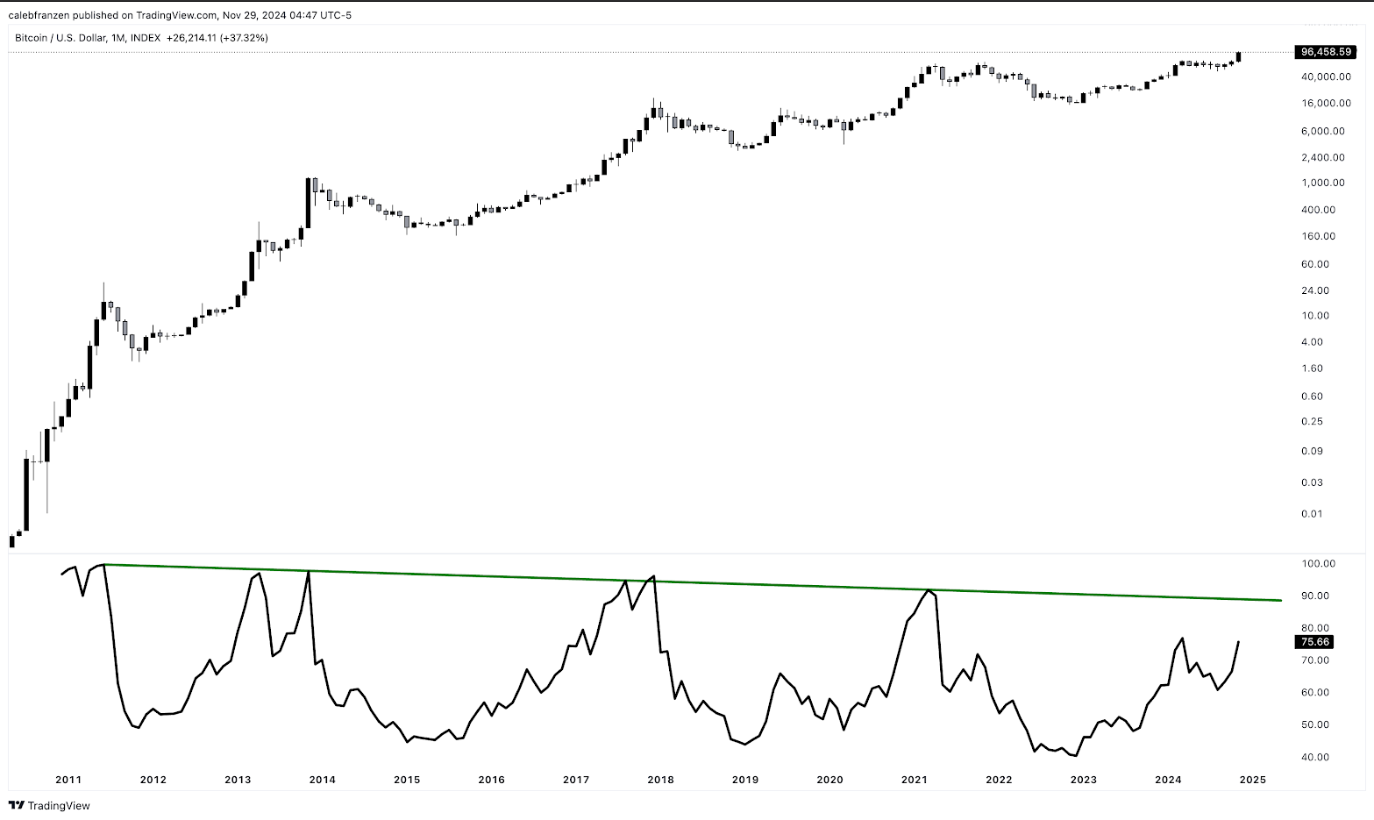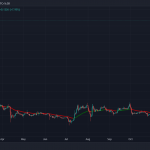Nov. 30, is the last trading day of the month, so all eyes will be on bitcoin's (BTC) monthly candle. Bitcoin is less than 4% away from the psychological wall of $100,000. While the <a href="https://www.coindesk.com/markets/2024/11/25/bitcoin-options-worth-9-b-expire-friday-traders-may-be-thankful-for-the-post-thanksgiving-volatility" target="_blank">$9 billion worth of options expiry</a> for bitcoin has just expired, which has sent the token slightly higher on the day to over $96,000. CoinGlass data shows that November has been one of the strongest months for bitcoin for several years, currently up over 36%, which would be the fourth best performing month since October 2021. November's rise has only been beaten thrice February 2024 (44%), January 2023 (40%) and October 2021 (40%). November's impressive performance is largely due to the fact that Donald Trump won the U.S. presidential election earlier this month. Yet, bitcoin still has two more days until the official monthly close so there is still time to beat these milestones. On a quarterly timeframe, bitcoin is currently up 51% on the quarter with December still to come, on average the month of December returns around 5%. Q4 2024 has been the strongest quarter since Q1 which returned 69%.

It seems a matter of when not if, bitcoin breaks past $100,000 while it is on track towards an all-time high monthly close. Analyst Caleb Franzen believes there is more juice left to squeeze in this current bitcoin bull market. "BTCUSD monthly chart with the RSI indicator: Bitcoin bull markets often peak with the monthly RSI trading above 90, versus the current level of 75. Historically, we've seen each bull market peak with a lower RSI, illustrated by the descending trend line, Franzen says. The implication is that momentum is not yet "overheated" and that more upside can be squeezed out of this uptrend in the months/quarters ahead".

Similar market structure to Q4 2020
Bitcoin is in a similar market structure to Q4 2020, both periods saw strong green months in October and November, with a correction during the <a href="https://www.coindesk.com/markets/2024/11/26/bitcoins-tumble-to-91-k-evokes-thanksgiving-massacre-of-2020" target="_blank">2020 Thanksgiving period</a>. In the back end of 2020, this was when bitcoin conclusively left behind the psychological barrier of $10,000 and went to $60,000 by April 2021. Glassnode data shows that when bitcoin is above the short-term holder's realized price (STHRP) it tends to mean bitcoin is in a bull market. In Q4 2020, bitcoin used the STHRP consistently as a support level, as the price continued higher. An expectation could be that bitcoin continues higher and using the STHRP as a support level mimicking Q4 2020. STHP reflects the average on-chain acquisition price for coins held outside exchange reserves, which were moved within the last 155 days. These reflect the most probable coins to be spent on any given day. There is also a growing divergence between the realized price (which reflects the average on-chain acquisition price for the entire coin supply) and the long-term holder realized price (LTHRP) which reflects the average on-chain acquisition price for coins held outside exchange reserves, which have not moved within the last 155-days. These reflect the least probable coins to be spent on any given day. A growing divergence tells us that new participants are entering the market while long-term holders are spending or realizing profits. One very small data point indicates that bitcoin could even hit $100,000 on Nov. 29. Bitcoin first hit $1,000 on Nov. 27, 2013. Four years and one day later, bitcoin first hit $10,000. Could we see $100,000, just seven years and one day later?

